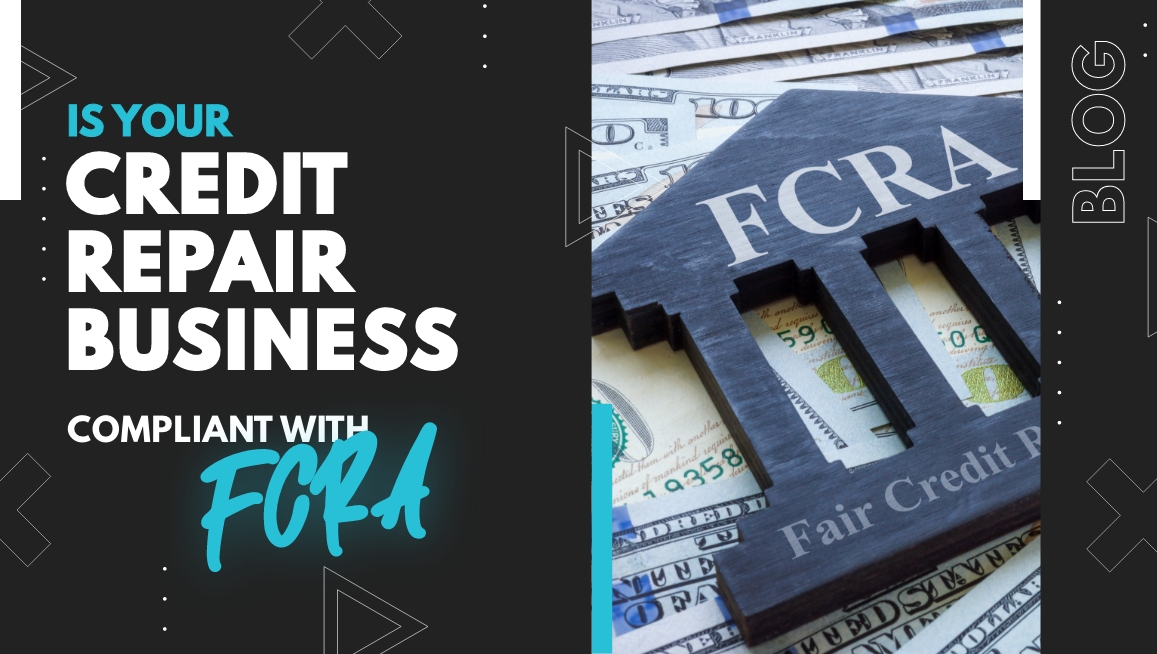Is Your Credit Repair Business Compliant with FCRA
by Almas Tariq
October 25, 2024
06:10 PM

Are you sure your credit repair business is fully compliant with the Fair Credit Reporting Act (FCRA)? Compliance with FCRA is critical for any Credit Repair Company aiming to stay legally sound and maintain a good reputation in the industry. Established in 1970, FCRA is a federal law designed to ensure the accuracy, fairness, and privacy of consumer information held by credit reporting agencies. As a credit repair business, understanding and following FCRA requirements is crucial for protecting both your company and your clients.
Non-compliance can lead to severe consequences, including legal penalties, hefty fines, and even lawsuits from clients. Furthermore, a violation could damage your business’s reputation and shake your clients’ trust. Therefore, staying FCRA-compliant is not just about avoiding trouble but also about setting high ethical standards in your industry. In this guide, we will explore FCRA requirements in detail, focusing on legal obligations, handling disputes, and using the right tools for compliance. Each section provides actionable insights so your credit repair business can stay on the right side of the law.
Understanding the Fair Credit Reporting Act: Key Legal Requirements
The Fair Credit Reporting Act provides essential guidelines for businesses that handle consumer credit information. For credit repair businesses, understanding these guidelines ensures that clients’ rights are protected. FCRA affects nearly every aspect of a credit repair operation, including dispute management, client communication, and data security.
What FCRA Means for Credit Repair Companies
FCRA sets specific rules for how Credit Repair Companies handle credit information and communicate with clients and credit bureaus. The act requires businesses to maintain transparency, avoid deceptive practices, and ensure that credit information is accurate and secure. By adhering to these rules, credit repair businesses can reduce the risk of errors and legal issues.
Key Provisions of FCRA for Credit Repair Businesses
- Accuracy of information: Ensure that any disputes or corrections you file are based on accurate information.
- Consumer rights to access and dispute: Clients have the right to view their credit reports and dispute inaccuracies without requiring your service.
- Data privacy and security: The FCRA mandates that sensitive data is protected against unauthorized access, particularly if it involves personal client information.
A deep understanding of these provisions is essential for staying compliant. Violations of FCRA’s terms could result in costly penalties or even a shutdown of your business.
Why Compliance is Essential for Client Trust
Clients expect their credit repair businesses to be honest and transparent. When a credit repair company follows FCRA guidelines, it sends a clear message of trustworthiness and professionalism. FCRA compliance doesn’t just protect your clients—it also safeguards your business by reducing potential liabilities.
The Role of Contracts and Disclosures in FCRA Compliance
Contracts serve as the foundation for transparent client relationships in any credit repair business. Not only do they outline the services your business provides, but they also define expectations and legal obligations. FCRA emphasizes the importance of clear, transparent contracts and specific disclosures to inform clients of their rights.
What Should a FCRA-Compliant Contract Include?
Your contracts should cover all details about the services you offer and the obligations your business undertakes. FCRA specifies certain disclosures that must be included to ensure that clients understand their rights and the scope of the service.
Key Disclosure Requirements Under FCRA:
- Clear service description: Explain exactly what your business will provide and avoid vague promises that may lead to misunderstandings.
- Client rights: Inform clients of their right to cancel services without penalties within a specified time frame.
- Access to credit information: Educate clients on their rights to access their credit report from each of the credit bureaus at least once annually.
Transparent contracts provide a strong foundation for client relationships. By clearly outlining the terms, clients can understand what to expect, minimizing the likelihood of disputes or misunderstandings down the line.
How Credit Repair Business Software Assists with Contracts and Disclosures
Handling contracts and disclosures manually can be both time-consuming and error-prone. This is where credit repair business software and credit repair CRM tools come into play. By automating parts of the process, these tools ensure that your contracts and disclosures meet FCRA standards without extra effort on your part.
Benefits of Using Credit Repair CRM for Contract Management
- Automated disclosures: Many CRM tools provide pre-built templates that align with FCRA’s disclosure requirements, allowing easy compliance.
- Centralized record-keeping: Store and manage all contracts and communications within a single system for easy reference.
- Regular updates: CRM software often updates automatically to reflect new FCRA guidelines, so your contracts always remain compliant.
With these tools, managing FCRA compliance becomes more manageable and reduces the risk of legal errors. They also provide an efficient way to track client interactions, ensuring a clear, well-documented record in case of any issues.
Handling Credit Repair Disputes While Staying FCRA Compliant
In the credit repair industry, disputes are inevitable. However, the way your business handles these disputes can either protect you or expose you to FCRA violations. Ensuring that disputes are managed in line with FCRA guidelines is critical for compliance.
Best Practices for FCRA-Compliant Dispute Management
When managing credit repair disputes, following FCRA’s standards is essential to protect both your clients and your business.
Steps to FCRA-Compliant Dispute Management:
- Thorough documentation: Maintain clear records of each step in the dispute process. Documentation is invaluable for audits or client inquiries.
- Verify claims: Before filing a dispute on behalf of a client, confirm the validity of the claim to avoid baseless disputes.
- Follow timelines: The FCRA outlines specific timelines for dispute resolution. Make sure you adhere to these deadlines to avoid non-compliance.
Following these steps can significantly reduce the risk of disputes escalating into legal issues. An organized, transparent process helps demonstrate your business’s commitment to accuracy and compliance.
How Technology Can Assist in Managing Disputes
Credit repair business software provides a systematic way to track disputes, ensuring that each case is handled promptly and accurately. Tools like credit repair CRM can help you manage dispute resolutions by centralizing documentation and maintaining a clear timeline of actions.
Key CRM Features for Dispute Management
- Dispute tracking: Track each dispute from initiation to resolution, with automated reminders for important deadlines.
- Secure record-keeping: Store all documentation and communication logs in a secure system to protect client information.
- Automated client updates: Notify clients of dispute status changes to ensure they are informed throughout the process.
By utilizing these tools, credit repair businesses can handle disputes efficiently while reducing the risk of FCRA violations.
The Role of Education and Training in FCRA Compliance
For a credit repair business, staying compliant with FCRA involves more than just management; it requires that every team member understands and follows the guidelines. A well-trained team is essential for ensuring that compliance standards are upheld consistently.
Why FCRA Education is Important for Credit Repair Companies
Credit repair training is critical to prevent accidental FCRA violations. Employees who are informed about FCRA’s requirements are less likely to make errors that could lead to compliance issues.
Benefits of FCRA Education:
- Minimizes risk: Trained staff are better equipped to handle tasks like managing disputes and communicating with clients without breaking FCRA rules.
- Improves client relationships: Educated employees can answer client questions confidently, building trust in your business.
- Ensures consistent standards: Training ensures that every team member understands their role in maintaining compliance, reducing the risk of errors.
Training Programs and Resources for FCRA Compliance
Investing in resources for team training can go a long way in building a strong culture of compliance. Many industry associations offer training modules, workshops, and certifications specifically for FCRA compliance in credit repair.
How to Choose the Right Credit Repair Business Software for FCRA Compliance
Technology plays a crucial role in managing FCRA compliance efficiently. The right credit repair CRM or credit repair business software can simplify your processes, improve record-keeping, and streamline compliance.
Key Features to Look for in FCRA-Compliant Software
When selecting software, it’s important to choose tools that align with FCRA’s requirements. Many systems offer compliance-specific features that reduce the risk of errors and simplify dispute management.
Essential Software Features for Compliance:
- FCRA-compliant templates: Built-in contract and disclosure templates that meet FCRA standards can reduce the risk of legal issues.
- Automated reminders: Tools that provide reminders for critical tasks, such as dispute deadlines, ensure timely compliance.
- Data security protocols: FCRA mandates that client information is stored securely. Choose software that has strong encryption and access controls.
The right technology can make a significant difference in compliance management. Automated processes reduce human error, while advanced tracking features allow you to maintain a high level of organization.
Best Practices for Staying Up-to-Date on FCRA and Other Credit Repair Laws
The regulatory environment for credit repair is always evolving. Staying informed about changes to FCRA and other credit-related laws is essential for maintaining compliance. Regular updates ensure that your business operates legally and stays competitive in the industry.
How Credit Repair Businesses Can Stay Current with Legal Changes
Following these practices can help your business stay up-to-date and protect against non-compliance issues.
Resources for Ongoing Compliance:
- Industry associations: Organizations like the National Association of Credit Services Organizations (NACSO) provide updates on regulatory changes.
- Professional networks: Connecting with other credit repair professionals helps you stay informed of industry trends and compliance issues.
- Regular training: Implement a continuous training program that incorporates any new FCRA updates.
Tools for Continuous FCRA Compliance
Investing in credit repair CRM or credit repair business software with automated updates is also a good approach to staying compliant. Many software providers offer regular legal updates to ensure that their systems align with the latest regulatory standards.
Conclusion: Ensuring FCRA Compliance for Your Credit Repair Business
Compliance with the Fair Credit Reporting Act is not optional for credit repair businesses. It is a vital component of building trust with clients, protecting sensitive information, and avoiding costly legal issues. By understanding FCRA’s key requirements, investing in training, using the right tools, and staying informed of legal changes, your credit repair business can maintain full compliance.
A proactive approach to FCRA compliance safeguards your business’s reputation and promotes a high standard of ethics within the credit repair industry. Following the best practices outlined in this guide ensures that you can operate your business confidently, knowing that you are on the right side of the law.
References:
Table of Contents
Explore More Insights
Dive deeper into a wealth of knowledge. Discover a multitude of articles covering diverse topics, expert perspectives, and the latest trends. Feed your curiosity and expand your understanding.



